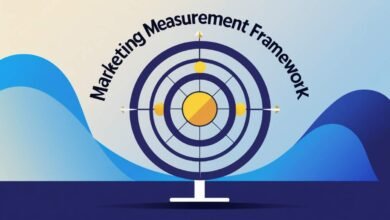Digital Marketing Measurement Framework: Ultimate Guide
Digital Marketing Measurement Framework

Digital marketing measurement framework is perhaps the key to effective campaign optimization and long-term success. A digital marketing measurement framework provides the infrastructure through which a business may measure and monitor its marketing efforts, identify the most critical data to examine, and thus optimize its marketing. This essay explores the key components of a complete framework, from KPIs to tools and techniques that businesses use for successful execution in digital marketing.
Why the Digital Marketing Measurement Framework
Without a framework, marketing efforts feel like shooting in the dark. A well-constructed digital marketing measurement framework provides structure and purpose to your campaigns, so every action can be measurable and analyzed. This improves your efficiency in marketing strategy and lets you adjust campaigns in real-time to maximize return on investment.
KPIs for Digital Marketing
KPIs or Key Performance Indicators form the core of any measurement framework. These benchmark indicators measure if your digital marketing campaign is effective. Using these, businesses can identify what is working for them and what needs improvement. Some of the most common KPIs for digital marketing are:
Website Traffic
A core metric for most digital marketing campaigns. It shows how many visitors are interacting with your website.
Bounce Rate
To understand your digital marketing strategy, these KPIs are useful in guiding your decisions.
Marketing Analytics Tools

Effective tracking and analysis of KPIs can be best achieved using marketing analytics tools that can collect data from various sources. These offer insights into how consumers behave and the effectiveness of your campaigns.
Google Analytics
Use it for website performance tracking and visitor demographics or user behavior.
HubSpot
A complete inbound marketing tool, that tracks leads, and customers, and helps in creating customer profiles.
Sprout Social
A social media analytics tool that tracks brand mentions, engagement rates, and overall impact of the social media campaign. Using these tools, businesses can collect detailed data that will support more informed marketing decisions.
Digital Campaign Performance Metrics
Measuring the success of any digital marketing campaign is not merely based on tracking traffic. Several performance metrics can paint a clearer picture of how your campaigns are performing. These include:
Engagement Rate
Percentage of users that are interacting with your content (liking, sharing, commenting) out of the total impressions.
Marketing Conversion Rate Optimization
The ultimate focus for digital marketers is Conversion Rate Optimization or CRO. CRO refers to the most popular method of increasing the percentage of website visitors who take a desired action.
User Experience Improvements

The overall design, speed, and functionality of a website are enhanced to decrease bounce rates and increase engagement.
Clear Call-to-Actions (CTAs)
Make the user’s next step clear, whether it’s clicking a button or filling out a form. Continuous optimization of conversion rates enables marketers to achieve better results from the same flow of traffic, maximizing the effectiveness of campaigns.
Customer Journey Tracking in Digital Marketing
Customer journeys are an integral part of effective digital marketing. For businesses to keep track of the customer journey, they use products such as customer relationship management (CRM) software and behavioral analytics platforms. Where customers are seen to ‘drop off’, mapping out the customer journey allows business owners to address these areas. Tracking the customer journey also enables marketers to provide more relevant content, which is more likely to be converted.
Establishing Benchmarks and Baselines
After agreeing on your KPIs with your objectives, the next thing is to set benchmarks and baselines. This allows you to have a platform from which you’ll measure the metrics. For instance, if your conversion rate is 2%, you can make it so that when you reach the quarter, it should be 3%. Benchmarks help keep your efforts focused and enable you to celebrate progress.
The Importance of Data Quality

A measurement framework is only as good as the quality of data it relies on. Poor data quality can result in incorrect conclusions and ineffective marketing decisions. A regular audit of your data collection processes will help keep up the high standards and ensure that your insights are reliable.
Reporting and Analyzing Your Findings
Once you collect enough data, it is time to analyze it. And that is when you compare what you have done with the performance against the KPIs and goals you set earlier. Google Data Studio or Power BI can help you render the most accurate visual report, not difficult to interpret. Regular reporting in this manner helps ensure that all different stakeholders of a campaign are reached in turn and informs data-driven decisions for future campaigns.
Adjusting and Optimizing Based on Results
The value of a digital marketing measurement framework is to allow it to guide future actions. Through analyzing your results, you may see areas that could use improvement. Perhaps one campaign isn’t hitting its ROAS as expected, or perhaps your bounce rate is a little too high. Use these lessons to adjust your strategy, adjust those future campaigns, and optimize them for better results.
Ongoing Monitoring for Long-term Success
Digital marketing is dynamic, and measuring once will not suffice. Continuous monitoring and real-time analysis are the keys to long-term success. Monitor your KPIs, performance metrics, and customer journey tracking data at regular intervals to maintain your edge over trends and make necessary adjustments in the strategy.
Conclusion
A good digital marketing measurement framework is crucial for any business aiming to succeed in the competitive online space. By formulating precise objectives, focusing on the correct KPI, usage of analytics tools, and real-time tuning of efforts, you can optimize your campaigns to be impactful as well as agile.
Frequently Asked Questions
What is the purpose of a digital marketing measurement framework?
The main objective is to follow, analyze, and enhance the performance of digital marketing campaigns with measurable KPIs and performance metrics.
Why are KPIs important in digital marketing?
KPIs give you insight into the effectiveness of your marketing efforts, and through such insights, you make decisions for improving performance.
What tools are best suited to follow computerized advertising execution?
Common tools for tracking website traffic, conversions, and SEO performance are Google Analytics, HubSpot, and SEMrush.
How does conversion rate optimization help in digital marketing?
CRO focuses on increasing the percentage of visitors who take desired actions, thus helping marketers maximize results without increasing traffic.
What role does customer journey tracking play in digital marketing?
Customer journey tracking helps marketers understand interactions at each stage, allowing for more personalized and effective marketing strategies.





